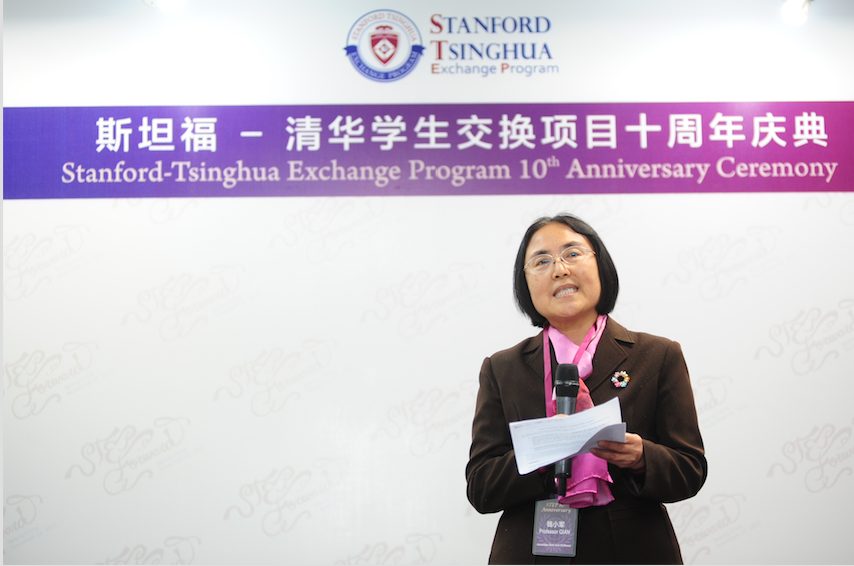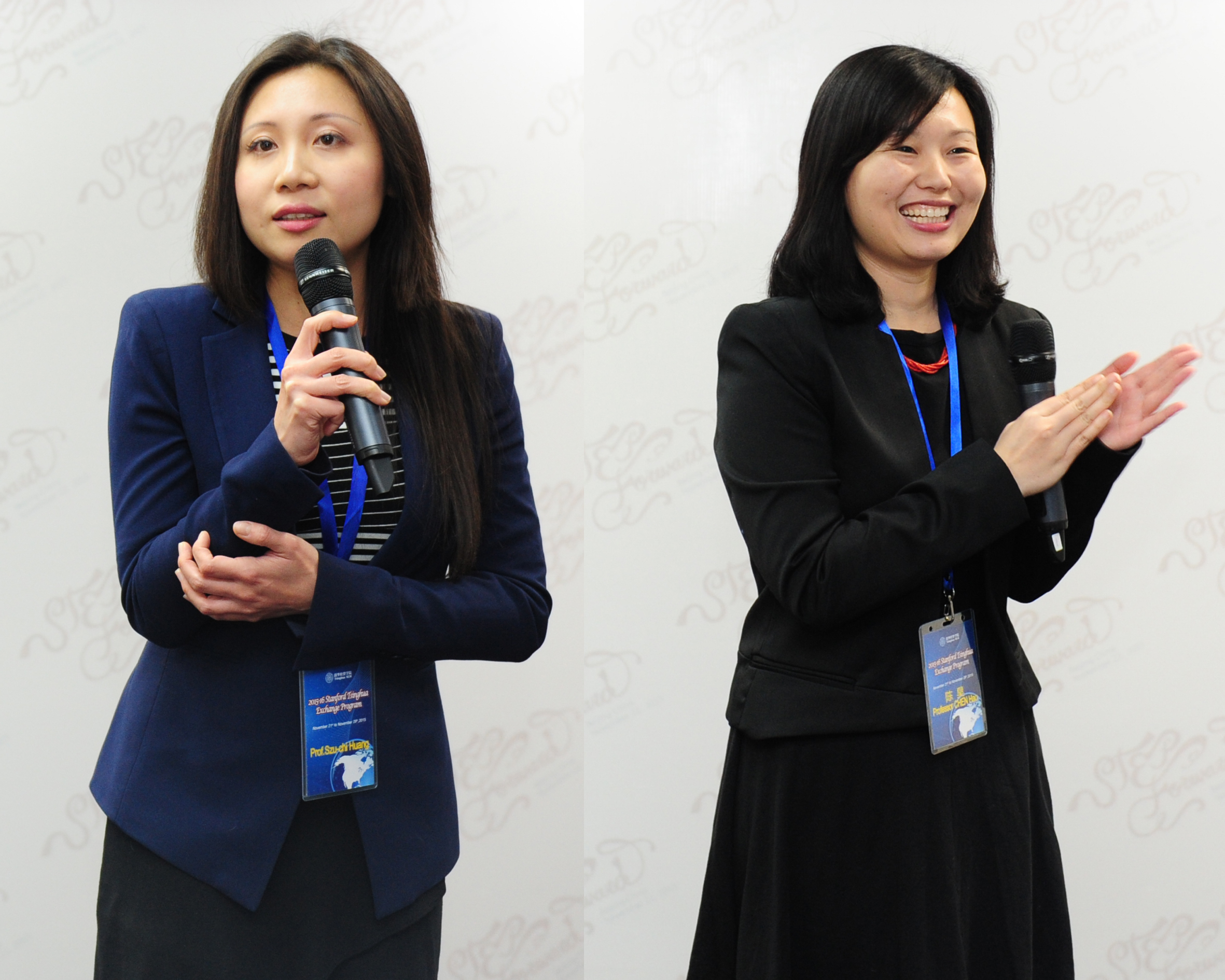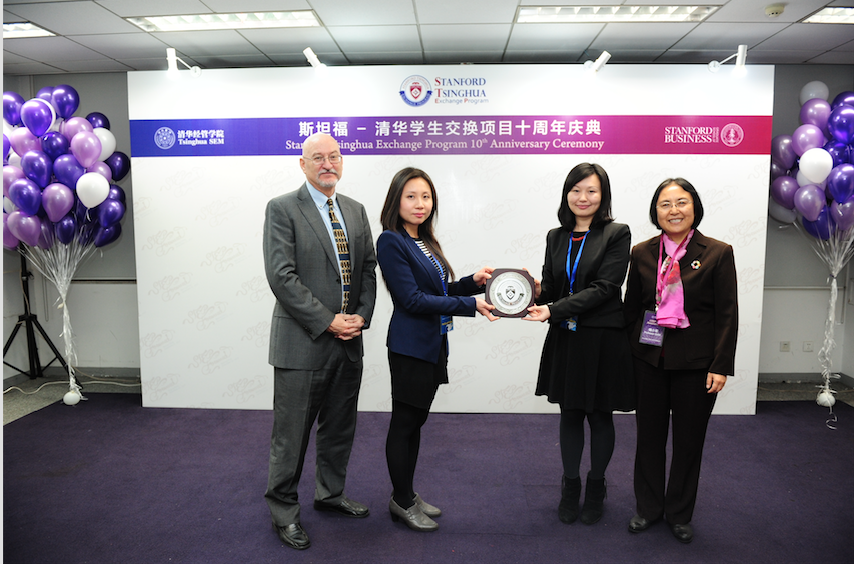Provided by the International Office, Editor in Charge: Yang Nali
On the evening of November 22, 2015, the 10th anniversary celebration of Stanford Tsinghua Exchange Program (STEP), with “STEP FORWARD” as its event theme, was held at Tsinghua SEM. The event was attended by Professor Qian Xiaojun, Associate Dean of Tsinghua SEM; Professor Zhang Wei, Academic Advisor of the first class of STEP and Associate Professor of Innovation, Entrepreneurship and Strategy; Professor Chen Hao, Academic Advisor of the current class of STEP and Assistant Professor of Leadership and Organization Management; Professor Huang Szu-chi, current Academic Advisor of the Graduate School of Business of Stanford University; Mr. Frank Hawke, Director of Stanford Business Greater China; and approximately 40 MBA students from the current STEP cohort of both schools and 10 MBA alumni from the previous MBA classes.

Professor Qian Xiaojun, Assistant Dean of Tsinghua SEM gives a speech during the 10th anniversary celebration of STEP.
Since its implementation in 2005, the STEP program has witnessed a decade of progress. During the past ten years, with its innovative and unique methodologies, STEP has forged a bond between students from both schools through which they can better appreciate each other’s experiences and vantage points. By the end of 2015, more than 400 students from both sides of the Pacific Ocean had attended and completed STEP. Over that span, they have built real personal and professional relationships, passed important milestones, and shared from their rich academic experiences.
The celebration was opened by Professor Qian Xiaojun, Associate Dean of Tsinghua SEM, who gave a heartfelt welcome speech to the participating guests on behalf of SEM. In her speech, Professor Qian affirmed the great achievements of STEP during the past decade. Professor Qian also articulated the uniqueness of STEP in its fostering of creativity. Every year, STEP students from both schools determine their own program content. Participants draw heavily on their creativity and team spirit to plan, modify, and implement every element of the program. Close cooperation has enabled the STEP participants to broaden their knowledge of the economies and cultures of both countries while developing strong and enduring friendships. It is because of its innovation and uniqueness that STEP has been so invigorating during the past ten years, thus building a relational bond of cooperation between students and faculty from both schools.
After Professor Qian’s opening address, the academic advisors from both schools offered their insights. Professor Huang Szu-chi from the Stanford Graduate School of Business expressed great honor to be the leading faculty of STEP. She noted that STEP was the only such exchange program to focus on close cooperation between the two leading universities from both China and the U.S. In her speech, Professor Chen Hao expressed her hope that the ongoing cooperation between Chinese and American STEP faculty and students would be far-reaching in its impact for both schools and even both countries in long-term societal influence.

Professor Huang Szu-chi (left), current Academic Advisor of Stanford Graduate School of Business, and Professor Chen Hao, Tsinghua SEM (right), Academic Advisor of the current class of STEP, give speeches.
Mr. Frank Hawke, Director of Stanford Business Greater China then shared his own work and life experience in China during the past 40 years. Mr. Hawke suggested that STEP was conducive to promoting cross-cultural communication and cooperation between Chinese and American students and that these qualities between aspiring young professionals from different countries do indeed engender social progress. He described his hope that his own experience in China could help American students participating in the program to understand China more quickly and familiarize themselves with the economic and political environment in China.

Prof. Qian Xiaojun (the first on the right), Assistant Dean of Tsinghua SEM, gave a ten-year anniversary commemoration present to Stanford University